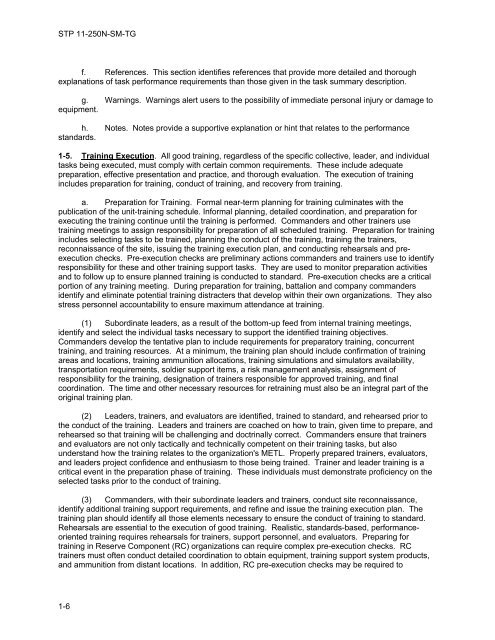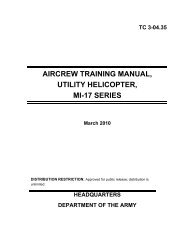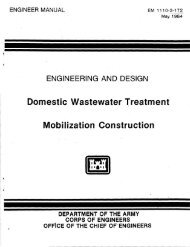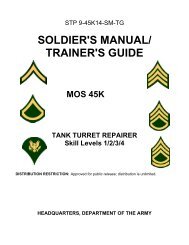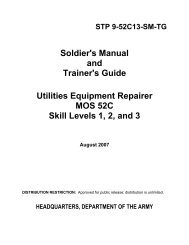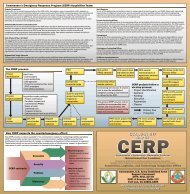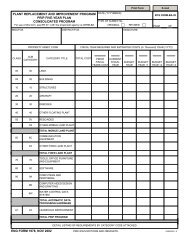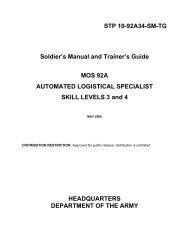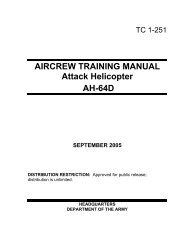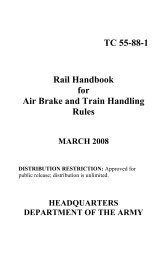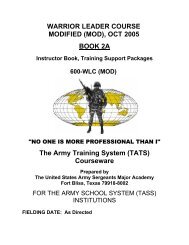SOLDIER'S MANUAL AND TRAINER'S GUIDE MOS 250N ... - AskTOP
SOLDIER'S MANUAL AND TRAINER'S GUIDE MOS 250N ... - AskTOP
SOLDIER'S MANUAL AND TRAINER'S GUIDE MOS 250N ... - AskTOP
You also want an ePaper? Increase the reach of your titles
YUMPU automatically turns print PDFs into web optimized ePapers that Google loves.
STP 11-<strong>250N</strong>-SM-TG<br />
f. References. This section identifies references that provide more detailed and thorough<br />
explanations of task performance requirements than those given in the task summary description.<br />
g. Warnings. Warnings alert users to the possibility of immediate personal injury or damage to<br />
equipment.<br />
h. Notes. Notes provide a supportive explanation or hint that relates to the performance<br />
standards.<br />
1-5. Training Execution. All good training, regardless of the specific collective, leader, and individual<br />
tasks being executed, must comply with certain common requirements. These include adequate<br />
preparation, effective presentation and practice, and thorough evaluation. The execution of training<br />
includes preparation for training, conduct of training, and recovery from training.<br />
a. Preparation for Training. Formal near-term planning for training culminates with the<br />
publication of the unit-training schedule. Informal planning, detailed coordination, and preparation for<br />
executing the training continue until the training is performed. Commanders and other trainers use<br />
training meetings to assign responsibility for preparation of all scheduled training. Preparation for training<br />
includes selecting tasks to be trained, planning the conduct of the training, training the trainers,<br />
reconnaissance of the site, issuing the training execution plan, and conducting rehearsals and preexecution<br />
checks. Pre-execution checks are preliminary actions commanders and trainers use to identify<br />
responsibility for these and other training support tasks. They are used to monitor preparation activities<br />
and to follow up to ensure planned training is conducted to standard. Pre-execution checks are a critical<br />
portion of any training meeting. During preparation for training, battalion and company commanders<br />
identify and eliminate potential training distracters that develop within their own organizations. They also<br />
stress personnel accountability to ensure maximum attendance at training.<br />
(1) Subordinate leaders, as a result of the bottom-up feed from internal training meetings,<br />
identify and select the individual tasks necessary to support the identified training objectives.<br />
Commanders develop the tentative plan to include requirements for preparatory training, concurrent<br />
training, and training resources. At a minimum, the training plan should include confirmation of training<br />
areas and locations, training ammunition allocations, training simulations and simulators availability,<br />
transportation requirements, soldier support items, a risk management analysis, assignment of<br />
responsibility for the training, designation of trainers responsible for approved training, and final<br />
coordination. The time and other necessary resources for retraining must also be an integral part of the<br />
original training plan.<br />
(2) Leaders, trainers, and evaluators are identified, trained to standard, and rehearsed prior to<br />
the conduct of the training. Leaders and trainers are coached on how to train, given time to prepare, and<br />
rehearsed so that training will be challenging and doctrinally correct. Commanders ensure that trainers<br />
and evaluators are not only tactically and technically competent on their training tasks, but also<br />
understand how the training relates to the organization's METL. Properly prepared trainers, evaluators,<br />
and leaders project confidence and enthusiasm to those being trained. Trainer and leader training is a<br />
critical event in the preparation phase of training. These individuals must demonstrate proficiency on the<br />
selected tasks prior to the conduct of training.<br />
(3) Commanders, with their subordinate leaders and trainers, conduct site reconnaissance,<br />
identify additional training support requirements, and refine and issue the training execution plan. The<br />
training plan should identify all those elements necessary to ensure the conduct of training to standard.<br />
Rehearsals are essential to the execution of good training. Realistic, standards-based, performanceoriented<br />
training requires rehearsals for trainers, support personnel, and evaluators. Preparing for<br />
training in Reserve Component (RC) organizations can require complex pre-execution checks. RC<br />
trainers must often conduct detailed coordination to obtain equipment, training support system products,<br />
and ammunition from distant locations. In addition, RC pre-execution checks may be required to<br />
1-6


